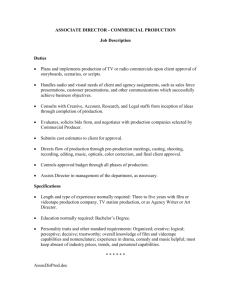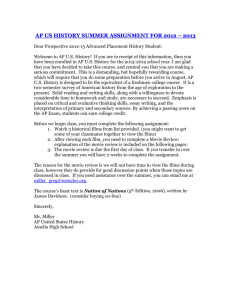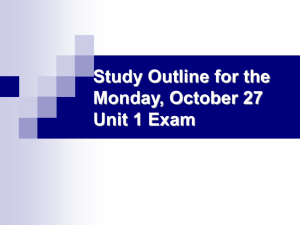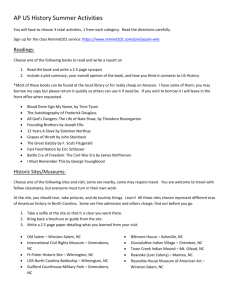Topical Film Review Presentations Instructions
advertisement
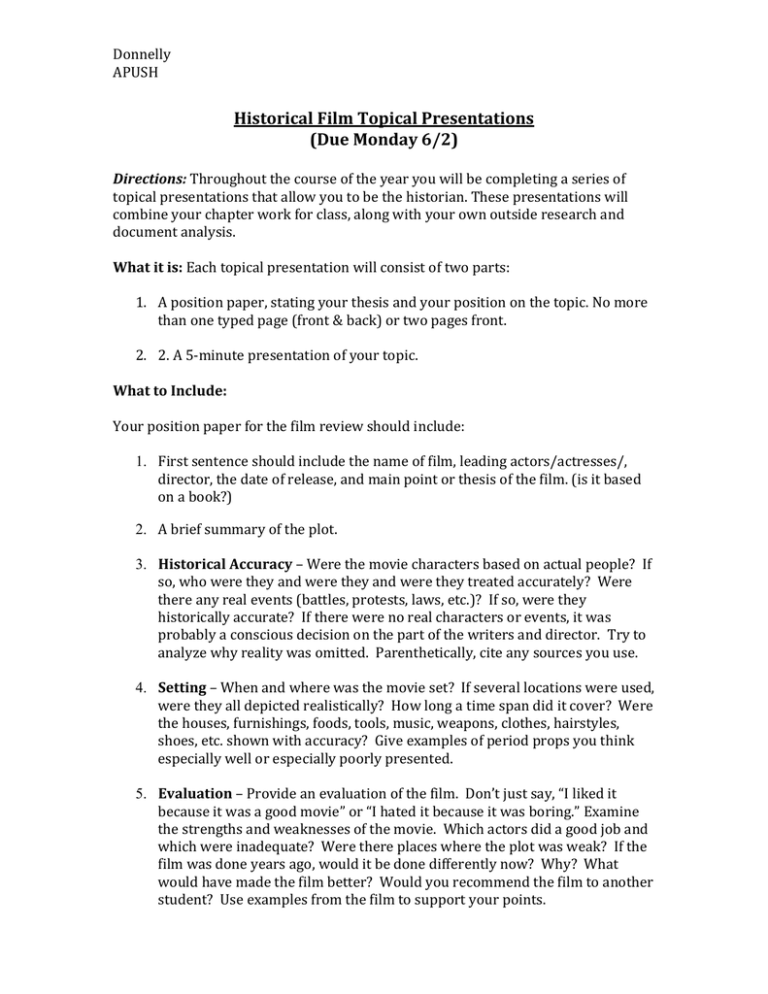
Donnelly APUSH Historical Film Topical Presentations (Due Monday 6/2) Directions: Throughout the course of the year you will be completing a series of topical presentations that allow you to be the historian. These presentations will combine your chapter work for class, along with your own outside research and document analysis. What it is: Each topical presentation will consist of two parts: 1. A position paper, stating your thesis and your position on the topic. No more than one typed page (front & back) or two pages front. 2. 2. A 5-minute presentation of your topic. What to Include: Your position paper for the film review should include: 1. First sentence should include the name of film, leading actors/actresses/, director, the date of release, and main point or thesis of the film. (is it based on a book?) 2. A brief summary of the plot. 3. Historical Accuracy – Were the movie characters based on actual people? If so, who were they and were they and were they treated accurately? Were there any real events (battles, protests, laws, etc.)? If so, were they historically accurate? If there were no real characters or events, it was probably a conscious decision on the part of the writers and director. Try to analyze why reality was omitted. Parenthetically, cite any sources you use. 4. Setting – When and where was the movie set? If several locations were used, were they all depicted realistically? How long a time span did it cover? Were the houses, furnishings, foods, tools, music, weapons, clothes, hairstyles, shoes, etc. shown with accuracy? Give examples of period props you think especially well or especially poorly presented. 5. Evaluation – Provide an evaluation of the film. Don’t just say, “I liked it because it was a good movie” or “I hated it because it was boring.” Examine the strengths and weaknesses of the movie. Which actors did a good job and which were inadequate? Were there places where the plot was weak? If the film was done years ago, would it be done differently now? Why? What would have made the film better? Would you recommend the film to another student? Use examples from the film to support your points. 6. Bibliography – Topicals must be accompanied by a properly formatted, annotated MLA bibliography. All information in the position paper must be referenced and cited using proper MLA format. Your presentation must include a visual aid - Power point, Prezi, Video, etc. Your thesis statement must be broadcast as part of your presentation Presentations should be lively and enthusiastic and encourage your audience to learn. Group Member Write-up and rubric - Each group member must turn in a typed paragraph of what they individually contributed to the presentation along with a print out of the topical rubric. o Every other member must sign off on the paragraph to get credit. Important details to note: - Each topical will be completed in student chosen groups of 2-3. - You may only work with a person once throughout the course of the year. - All work on topicals will be done outside of class time. Make sure to choose your groups wisely. - If your group is scheduled to present on a day that you cannot be prepared for, it is your job to find a group that is willing to switch. - Presentations go on even if a group member is absent. You are responsible for their part. - All topics will be selected by your group from the list provided. Order will be determined using a random lottery system. - Presentation dates and times will be scheduled based on topic chosen. - Individual group member write up will be used for the individual portion of the grade. This ensures accountability for all members. If they don’t contribute, don’t sign off on their paragraph. Possible Films (note some of the films carry an “R” rating) 17th Century The Crucible (1996) – Salem witch trials; Puritans 18th Century Last of the Mohicans (1992) – French & Indian War 1776 (1972)– musical about writing the Declaration The Patriot (2000) – Revolutionary War Jefferson in Paris (1995) – French Revolution, Sally Hemings 19th Century The Buccaneer (1958) – War of 1812 Amistad (1997) – 1839 slave ship uprising and trial The Alamo (2004) – 1836 battle of Texas Revolution Santa Fe Trail (1940) – Lead--‐up to the Civil War Gone With The Wind (1939) – Antebellum and Civil War South Gods & Generals (2003) –rise and fall of Stonewall Jackson Gettysburg (1993) – decisive battle of the Civil War Gangs of New York (2002) – Civil War era cities and immigrants Glory (1989) – Civil War; African--‐American regiment 54th Massachusetts Tombstone (1993)– life in the old West Buffalo Soldiers (1997) – African Americans in the West Dances With Wolves (1990) –Civil War era relations with Native Americans Far & Away (1992) – Immigration and Western Expansion The Molly Maguires (1970) – 1876 coal miners’ strike 20th Century All Quiet on the Western Front (1930) – WW I fighting in Trenches Birth of a Nation (1915) – silent, rise of the KKK Iron Jawed Angles (2004)– Women’s movement Inherit the Wind (1960) – Scopes Monkey Trial Matewan (1987) – Coal Mining Strike during the 20s Cinderella Man (2005) – Depression Era boxer Grapes of Wrath (1940)– Depression in the Plains and California Tora, Tora, Tora (1970) – Pearl Harbor Pearl Harbor (2001) –World War II The Longest Day (1962) – D-Day (John Wayne) Band of Brothers (2001) – World War II, 101st Airborne Letter from Iwo Jima (2006) – WW II from the Japanese Perspective Flags of Our Fathers (2006) – American Soldiers who raised the flag on Iwo Jima Schindler’s List (1993) – World War II, concentration camps Saving Private Ryan (1998) – World War II The Best Years of Our Life (1946) – WW II soldiers return home The Right Stuff (1983) – 1950s Cold War, beginning of space race Best Years of Our Lives – Post WW II society October Sky (1999) –Post Sputnik; boy meets rocketry Dr. Strangelove (1964) – Cold War arms race The Majestic (2001) – McCarthyism; Hollywood blacklisting Pleasantville (1998) – 1950s America Mississippi Burning (1998) – Civil Rights A Time to Kill (1996) –Civil Rights Thirteen Days (2000) – Cuban Missile Crisis JFK (1991) – Kennedy assassination Bobby (2006) – JFK’s younger brother Mississippi Burning (1986) – the murder of 3 civil rights workers Eyes on the Prize – PBS and the Civil Rights movement Twelve Angry Men (1957) – Jury Decision Malcolm X (1992) – influential Black Nationalist leader Forrest Gump (1994) – various events 1950s through 1980s We Were Soldiers (2002) – Vietnam War American Graffiti (1973) – American life during the 60s (a young Harrison Ford + Richard Dreyfuss) The Dear Hunter (1973) – Vietnam War and impact on individual (graphic) Platoon (1986) –Vietnam War (a young Charlie Sheen) Return with Honor – PBS (American Experience) about POW’s and their return home Good Morning Vietnam (1987) – Vietnam War Two Days in October – protest of Vietnam War at University of Wisconsin All the President’s Men (1976) – Watergate Nixon (1995) – biography of President Richard M. Nixon



